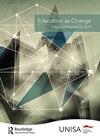国际大学管理人员交际英语语言课程
IF 1
4区 教育学
Q3 EDUCATION & EDUCATIONAL RESEARCH
引用次数: 0
摘要
通过一项定性案例研究,对学生访谈、教师反思报告和课堂观察数据进行三角分析,以了解当地语言课程如何为台湾行政人员在国际大学的工作环境中进行国际交流做好准备。研究结果首先表明,教师将课程规划视为师生共同开发、共同调节、共同修改和共同管理学习资源和内容的过程。教师授权行政人员选择他们认为有助于履行工作职责的语言学习目标。第二,行政人员的参与对于创建和管理国际交流语言资源非常重要。老师使用了符合行政人员需求的词汇、对话、写作和口语练习。行政人员根据他们的知识差距选择了目标词汇,然后用于共同构建对话,以解决工作人员以前遇到的需要在国际比赛中使用英语的情况。第三,开发课程以满足行政人员的沟通需求是一个重新平衡教师自主性、学习者自主性和课程开发的过程。教师和学生都认为该课程有效地鼓励了行政人员在英语学习和使用方面的实际变化,他们主要将其归因于该课程的非正规性质和上级管理层的支持。研究结果对规划和实施国际交流英语课程产生了影响本文章由计算机程序翻译,如有差异,请以英文原文为准。
A Language Course to Teach Administrative Staff English for Communication in an International University
A qualitative case study was conducted to triangulate student interviews, a teacher’s reflection report, and classroom observation data to understand how a local language course prepared Taiwanese administrative staff for international communication across working contexts in an international university. The findings firstly show that the teacher treated course planning as a teacher and student process of co-developing, co-moderating, co-revising, and co-managing learning resources and content. The teacher empowered the administrative staff by giving them the authority to select language targets for study that the staff thought would be useful to fulfil their job duties. Secondly, participation of the administrative staff was important in creating and managing language resources for international communication. The teacher used vocabulary and dialogue writing and speaking practices that were contextualised to the needs of the administrative staff. The targeted vocabulary was selected by the administrative staff based on gaps in their knowledge and was then used to co-construct dialogues that addressed scenarios the staff had previously encountered that necessitated the use of English with internationals. Thirdly, developing the course to address the administrative staff’s communication needs was a process of rebalancing teacher autonomy, learner autonomy, and course development. Both the teacher and the students perceived the course effective in encouraging practical changes in the administrative staff’s learning and use of English, which they mostly attributed to the non-formal nature of the course and the support from higher management. Implications for planning and implementing English language courses for international communication were drawn from the findings
求助全文
通过发布文献求助,成功后即可免费获取论文全文。
去求助
来源期刊

Education As Change
EDUCATION & EDUCATIONAL RESEARCH-
CiteScore
1.40
自引率
0.00%
发文量
29
审稿时长
24 weeks
期刊介绍:
Education as Change is an accredited, peer reviewed scholarly online journal that publishes original articles reflecting critically on issues of equality in education and on the ways in which educational practices contribute to transformation in non-formal, formal and informal contexts. Critique, mainly understood in the tradition of critical pedagogies, is a constructive process which contributes towards a better world. Contributions from and about marginalised communities and from different knowledge traditions are encouraged. The articles could draw on any rigorous research methodology, as well as transdisciplinary approaches. Research of a very specialised or technical nature should be framed within relevant discourses. While specialised kinds of research are encouraged, authors are expected to write for a broader audience of educational researchers and practitioners without losing conceptual and theoretical depth and rigour. All sectors of education are covered in the journal. These include primary, secondary and tertiary education, adult education, worker education, educational policy and teacher education.
 求助内容:
求助内容: 应助结果提醒方式:
应助结果提醒方式:


